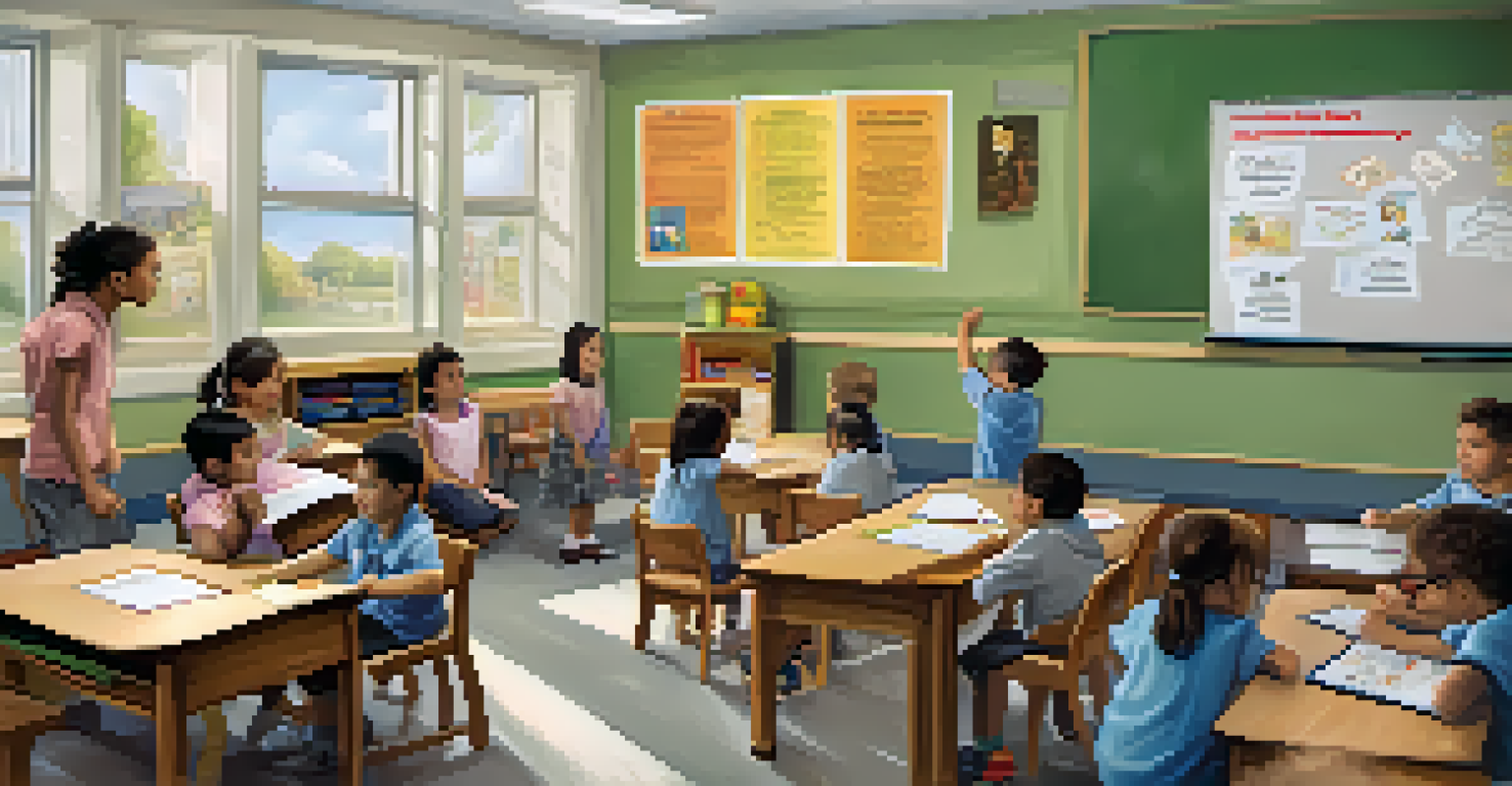Self Defense Role-Playing Activities for Children’s Learning

What is Role-Playing in Self Defense for Kids?
Role-playing is a fun and interactive way for children to learn self-defense skills. By acting out scenarios, they can practice responding to various situations in a safe environment. This method not only makes learning enjoyable but also helps kids understand the importance of awareness and safety.
Self-defense is not just about physical skills; it's about building confidence and resilience in children.
When children engage in role-playing, they can explore different ways to react to potential threats. For instance, they might pretend to encounter a stranger and practice how to assertively say 'no' or seek help. These experiences build confidence and empower kids to handle unexpected situations with composure.
Moreover, role-playing encourages creativity and problem-solving. Kids can brainstorm different scenarios and solutions, which helps them think critically about their safety. This playful approach allows them to absorb valuable lessons while having fun with their peers.
Benefits of Self Defense Role-Playing Activities
Self-defense role-playing activities offer numerous benefits for children’s development. First and foremost, they help instill confidence, which is crucial for kids as they navigate social interactions. When children feel secure in their ability to defend themselves, they are less likely to become targets for bullies or unsafe situations.

In addition to building confidence, these activities promote teamwork and communication skills. As kids work together in role-playing scenarios, they learn how to express their thoughts and listen to others. This collaborative aspect can strengthen friendships and create a supportive environment for learning.
Role-Playing Boosts Kids' Confidence
Engaging in self-defense role-playing helps children build confidence and empowers them to handle unexpected situations.
Finally, these activities also teach emotional regulation. When children simulate stressful situations, they practice managing their emotions, which is a valuable life skill. Learning how to stay calm under pressure can benefit them not just in self-defense, but in many areas of life.
Creative Role-Playing Scenarios for Kids
Creating engaging role-playing scenarios is key to keeping kids interested in self-defense training. One idea is to set up a 'stranger danger' scenario where children practice identifying safe adults and making a plan to seek help. This can be done in a park, school, or home setting, allowing kids to visualize and rehearse their responses.
The greatest weapon against bullying is the ability to communicate effectively and assertively.
Another fun scenario could involve a 'bully encounter.' Kids can role-play different responses, such as walking away, using assertive communication, or seeking assistance from an adult. This not only teaches them how to handle bullies but also encourages empathy as they understand the feelings of others involved.
Lastly, incorporating fun themes like superheroes can make learning even more enjoyable. Children can pretend to be their favorite characters while practicing self-defense techniques, which can motivate them to participate actively. This imaginative twist can make the lessons more memorable and relatable.
Incorporating Self Defense into Playtime
Parents and educators can easily incorporate self-defense concepts into children's playtime. For example, during playdates, adults can introduce games that involve problem-solving and safety awareness. Simple activities like 'Simon Says' can be modified to include self-defense moves, keeping kids engaged while learning.
Additionally, family outings can serve as an opportunity to practice self-defense skills. While at the park or a community event, parents can discuss safe practices and encourage kids to identify safe spaces or people. This real-world application reinforces the lessons learned during role-playing activities.
Creative Scenarios Enhance Learning
Fun and imaginative role-playing scenarios keep kids interested and make self-defense skills more relatable and memorable.
Moreover, integrating self-defense into everyday discussions can be beneficial. Parents can casually talk about safety while driving or walking, helping kids associate these concepts with daily life. This continuous reinforcement ensures that self-defense becomes a natural part of their routine.
Setting the Right Environment for Learning
Creating a supportive and safe environment is essential for effective learning in self-defense. Children should feel comfortable expressing themselves and asking questions during role-playing activities. A positive atmosphere encourages them to engage fully and take risks in their learning.
It’s also important to establish clear rules and guidelines for role-playing scenarios. Children should understand the boundaries of the activity and the importance of respecting each other's feelings. This clarity helps prevent misunderstandings and ensures that everyone feels safe and included.
Finally, adults should model appropriate behavior and responses during these activities. By demonstrating calmness and respect, they set the tone for how children should interact with one another. This modeling reinforces the values of self-defense, such as assertiveness and empathy.
Teaching Conflict Resolution through Role-Playing
Role-playing activities can also serve as a powerful tool for teaching conflict resolution. Kids can engage in scenarios that involve disagreements or misunderstandings, allowing them to practice finding peaceful solutions. This skill is invaluable as they navigate friendships and social dynamics.
For instance, children can role-play a situation where two friends want to play different games. They can practice negotiating and compromising, learning that conflicts can often be resolved through communication. This approach not only enhances their self-defense skills but also fosters teamwork and understanding.
Continuous Practice Reinforces Skills
Regular role-playing sessions and self-defense classes encourage ongoing learning and help kids retain their skills over time.
Moreover, discussing the outcomes of each role-play scenario can reinforce the lessons learned. Adults can guide children in reflecting on what worked and what didn’t, helping them develop critical thinking skills. This reflective practice makes the learning experience more impactful and memorable.
Encouraging Continuous Learning and Practice
To ensure that children retain their self-defense skills, it’s important to encourage continuous learning and practice. Parents can set aside time for regular role-playing sessions at home, making it a fun family activity. Routine practice helps reinforce the techniques and concepts they've learned.
In addition, enrolling children in self-defense classes can further their skills and provide them with professional guidance. These classes often incorporate role-playing into their curriculum, giving kids a chance to practice in a structured environment. Plus, they can meet new friends who share similar interests!

Lastly, celebrating small victories and progress can motivate kids to keep learning. Whether it's mastering a new technique or confidently handling a role-play scenario, acknowledging their achievements builds self-esteem. This positive reinforcement encourages a lifelong commitment to personal safety and self-defense.